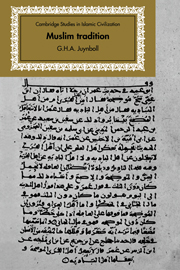Book contents
- Frontmatter
- Contents
- Preface
- Note to the Reader
- Introduction
- 1 A tentative chronology of the origins of Muslim tradition
- 2 The role of qāḍīs in the spreading of traditions
- 3 The man kadhaba tradition and the prohibition of lamenting the dead. An investigation into mutawātir traditions
- 4 An appraisal of muslim ḥadīth criticism. Rijāl works as depositories of transmitters' names
- 5 ‘Accepting traditions means knowing the men’
- Appendix I
- Appendix II
- Appendix III
- Appendix IV
- Appendix V
- Bibliography
- Index (glossary)
5 - ‘Accepting traditions means knowing the men’
Published online by Cambridge University Press: 04 August 2010
- Frontmatter
- Contents
- Preface
- Note to the Reader
- Introduction
- 1 A tentative chronology of the origins of Muslim tradition
- 2 The role of qāḍīs in the spreading of traditions
- 3 The man kadhaba tradition and the prohibition of lamenting the dead. An investigation into mutawātir traditions
- 4 An appraisal of muslim ḥadīth criticism. Rijāl works as depositories of transmitters' names
- 5 ‘Accepting traditions means knowing the men’
- Appendix I
- Appendix II
- Appendix III
- Appendix IV
- Appendix V
- Bibliography
- Index (glossary)
Summary
Atānī bi-isnādihi mukhbirun
wa-qad bāna lī kadhibu ′n-nāqilī
Abū ′l-ʿAlāʾ al-MaʿarrīIntroduction
The following chapter ties in with the preceding ones. In Chapter 3 the phenomenon of mutawātir traditions was discussed using as a prime example the man kadhaba saying. This saying, or better perhaps, slogan, was brought into circulation in an attempt to curb further spreading of mendacity in ḥadīth. Now I should like to deal with the methods devised by devout muḥaddithūn to detect kadhib and to expose the perpetrators of ḥadīth forgery.
One of the most important measures taken by those concerned with ḥadīth was the scrutiny of transmitters, the origins of which were described in Chapter 1. In Chapter 4 the names of these transmitters – as arranged in the earliest biographical lexica with or without accompanying biographical sketches – were studied, and it may have appeared that a great many names might well be taken as referring to non-existent transmitters. It goes without saying, however, that a sizable number of these names did indeed point to historical personalities. How the most important of those ḥadīth personalities fared at the hands of Islam's earliest ḥadīth (i.e. eventually isnād) critics is the main subject of the present chapter.
It is not likely that ḥadīth criticism in Islam began with isnād criticism, as, indeed, ḥadīth may have had its origins in a time when the institution of the isnād had not yet come into existence.
- Type
- Chapter
- Information
- Muslim TraditionStudies in Chronology, Provenance and Authorship of Early Hadith, pp. 161 - 217Publisher: Cambridge University PressPrint publication year: 1983



